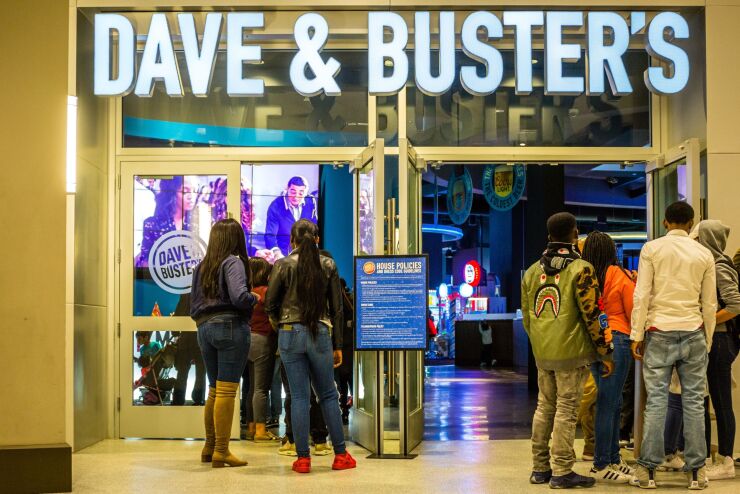In April, with the coronavirus pandemic in full swing in the U.S., Texas billionaire Tilman Fertitta had little choice but to turn to the then-frozen leveraged-loan market. He offered a staggering 16% yield to entice investors to extend a lifeline to his empire of Golden Nugget casinos and restaurants such as Bubba Gump Shrimp Co. and Rainforest Cafe. The $300 million loan ultimately priced to yield 14%, a level I called
Fast-forward six months to last Friday. That loan rallied more than any other member of the S&P/LSTA Leveraged Loan Index, according to data compiled by Bloomberg, reaching about 113 cents on the dollar for a yield of 5.8%.
Now, this isn’t a groundbreaking new level. The loan surged in late June, after Fertitta
Still, I thought of this deal — and the quick and huge return for investors who took the risk when uncertainty was the highest — after seeing the new offerings in the speculative-grade debt markets. It’s worth a reminder that Fertitta’s leveraged loan is still likely to prove the exception, not the norm, during this unusual economic crisis.
Consider Dave & Buster’s Entertainment Inc., which faces many of the same issues as brick-and-mortar Golden Nugget casinos. Namely, are people ready to go indoors and drink among a bunch of strangers while gambling or playing arcade games? The company

As part of the transaction, the company is suspending certain maintenance covenants through April 2022, adding a $150 million minimum liquidity covenant and extending the maturity of its revolving credit facility by two years to 2024, according to a news release. Upon closing, the company will have about $299 million in available liquidity.
The chain has faced breaching the terms of its $500 million revolving credit facility after pandemic shutdowns sent its revenue plunging. A waiver from lenders was set to expire Nov. 1, and the company has previously warned that it may need to file Chapter 11 to restructure its obligations.
The bonds priced to yield 7.625%, down from initial talk in the 8% to 8.25% range. Is that enough, given the explicit bankruptcy risk? Moody's Investors Service rates the notes Caa1, among the lowest grades outside of default, while S&P Global Ratings considers them one step better, at B-. The average yield in the Bloomberg Barclays junk-bond index is 5.28%. The portion of the benchmark rated triple-C yields 9.35%, close to the lowest level since October 2018.
Then there’s Ligado Networks LLC, which priced $3.85 billion in debt with a 17.5% coupon in a last-ditch effort to avert a Chapter 11 filing. Not only is that the highest rate for a junk bond since at least 2002, but the company will pay in new debt only, in what’s called payment-in-kind financing. “This restructuring is critical to Ligado’s ability to pursue several paths to improve its credit trajectory, including the development of an organic business model targeting several existing or new end markets,” according to Moody’s. That’s hardly a guarantee the company will find a way to avert insolvency.
Overall, credit markets saw several new deals this week from risky, pandemic-plagued companies like United Airlines Holdings Inc. and Sizzling Platter LLC, which operates restaurants including Dunkin’ Donuts, Little Caesars and Red Robin. These borrowers are clearly looking to lock in financing before potential volatility around the U.S. election. Investors should be wary about these shoehorned offerings.
There’s no question that this has been a strange crisis. On the one hand, large companies have had no trouble selling bonds at near record-low yield levels, with 2020 investment-grade issuance currently at $1.6 trillion and high yield at $357 billion. Yet there have also been more than 200 bankruptcy filings by businesses with more than $50 million in liabilities, the most since 2009, according to data compiled by Bloomberg.
While Chapter 11 cases have steadied in recent weeks after spiking during the summer, it’s an open question whether that will last as the country heads into the coldest months of the year; cases are already starting to surge in states from Vermont to Wisconsin to New Mexico. BlackRock Inc. is among those who say the
The Federal Reserve’s unprecedented foray into credit markets has staved off a worst-case scenario. But that’s not the same as saying vulnerable companies are out of the woods. Dave & Buster’s shares jumped 7.4% on Monday and 8.2% on Tuesday, reaching $18.79, up from as low as $4.61 in mid-March. Some analysts say the new bonds “remove our primary concern and a key overhang.” While liquidity is important, to focus entirely on that seems shortsighted. Philip Brendel, a distressed credit analyst with Bloomberg Intelligence, has a more
With high-yield spreads back near pre-pandemic levels, investors would be wise to tread carefully. They already pushed back against two junk-bond sales last week. It stands to reason that borrowers should be more keen to sweeten terms in return for locking in funding before Nov. 3.
But most important, investors need to remember that speculative-grade companies aren’t immune from going bust, no matter how wide open the debt markets might be. Junk-rated bonds, backed by a business that can’t make it through the pandemic, are just junk.
- Brian Chappatta





